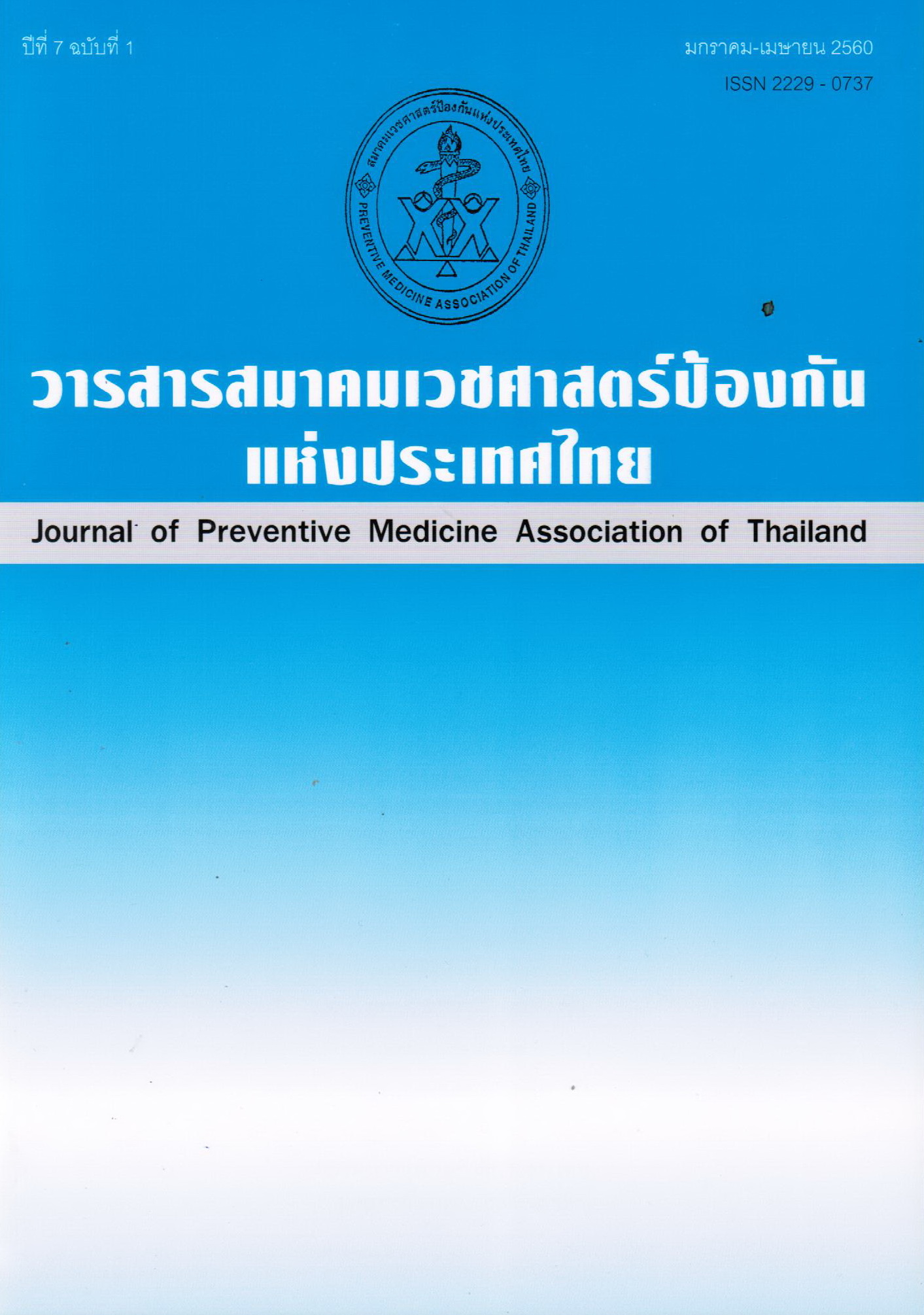Effects of Development for Type II Diabetes Care Model in Preventing and Delaying the Progression of Diabetic Kidney Disease Bang pa-in Hospital
Keywords:
Prevention, Deleying, Diabetic kidney diseaseAbstract
This study is a quasi-experimental research which was conducted on a single group pre-post research design basis. The objectives of this study was to find out the effects of development for type II diabetes care model in preventing and delaying the progression of Diabetic kidney disease which had been applied from the Health Belief Model theory. The population of this research consisted of 40 type II diabetes patients registering for medical treatments at the diabetes clinic of Bang Pa-in Hospital, Phra Nakhon Si Ayutthaya Province, all of whom were selected on a purposive sampling basis. Pre-construction questionnaires and laboratory test were used as data collection tools, and the obtained data were analyzed with statistical methods namely frequency, percentage, Fisher ‘s exact Test, and paired t-test.
The findings indicated that type II diabetes care model to prevent and delay kidney deterioration could be operated with the following process: 1) Screening for kidney diseases and evaluating stages of kidney diseases. 2) Educating about kidney diseases as well as food, exercises, medicines, and stresses. 3) Evaluating and monitoring to inform the population about changes in results. After monitoring and evaluating the results of the care model, it was apparent that the warnings for the population to take actions to prevent and delay kidney deterioration was that they were informed about their kidney levels and risk factors that affect kidneys. Besides, being warned about kidney diseases and receiving information and knowledge about kidney diseases was found in correlation with self-care behaviors to prevent and delay kidney deterioration and in correlation with estimated glomerular filtration rates at the statistical significance level of p-value <.05. Mean scores of the post test results about estimated glomerular filtration rates and kidney disease knowledge and prevention and delay kidney deterioration among the population were found higher than those before using the developed care model at the statistical significance level of p-value <.05.
References
2. ชุติมา กาญจนวงค์. Diabetic nephropathy in type 2 Diabetic patients at Lampang Hospital. วารสารลำปาง 2553;29(1):20-29.
3. สำนักงานสาธารณสุขจังหวัดพระนครศรีอยุธยา. รายงานการประเมินค่าการทำงานของไต (eGFR) ในผู้ป่วยเบาหวานเรื้อรัง. (ออนไลน์). (เข้าถึงเมื่อ 30 เมษายน 2557). เข้าถึงได้จาก: http://203.157.126.45/ncd/chronic/rep_dmgfr.php/
4. โรงพยาบาลบางปะอิน. รายงานตัวชี้วัดในการดูแลผู้ป่วยเบาหวานของคลินิกโรคเรื้อรัง. พระนครศรีอยุธยา: โรงพยาบาลบางปะอิน; 2556.
5. สมาคมโรคไตแห่งประเทศไทย. คู่มือการดูแลผู้ป่วยโรคไตเรื้อรังระยะเริ่มต้น. กรุงเทพฯ: ยูเนียน อุลตร้าไวโอเร็ต จำกัด; 2555.
6. ผาณิต หลีเจริญ. การนำรูปแบบ TIM ไปใช้ในการปรับพฤติกรรมเพื่อการป้องกัน การเกิดภาวะแทรกซ้อนในผู้ป่วยโรคเรื้อรัง. (ออนไลน์). (เข้าถึงเมื่อ 10 สิงหาคม 2557). เข้าถึงได้จาก: http://www.tcithaijo.org/index.php/tnaph/article/download/16527/14949
7. สุปรียา ตันสกุล. ทฤษฎีทางพฤติกรรมศาสตร์ แนวทางการดำเนินงานสุขศึกษาและส่งเสริมสุขภาพ. (ออนไลน์). (เข้าถึงเมื่อ 10 สิงหาคม 2557). เข้าถึงได้จาก: http://ns2.ph.mahidol.ac.th/phklb/knowledgefiles/1_.pdf
8. เบญมาศ สุขศรีเพ็ง. แบบแผนความเชื่อด้านสุขภาพ(Health belief Model). (ออนไลน์). (เข้าถึงเมื่อ 10 สิงหาคม 2557). เข้าถึงได้จาก:https://www.gotoknow.org/posts/115420
9. ปิ่นแก้ว คล้ายประยงค์, กรัณฑรัตน์ บุญช่วยธนาสิทธิ์. ประสิทธิผลของโปรแกรมในการสร้างเสริมพฤติกรรมการปฏิบัติตัวเพื่อชะลอการเสื่อมของไตสู่ภาวะโรคไตเรื้อรังระยะสุดท้าย ของผู้ป่วยโรคไตเรื้อรังระยะที่ 3 และ 4 ที่แผนกผู้ป่วยนอก อายุรกรรมโรคไต โรงพยาบาลรามาธิบดี. (วิทยานิพนธ์ ปริญญาวิทยาศาสตร์มหาบัณฑิต). สาขาสุขศึกษา. กรุงเทพฯ: มหาวิทยาลัยเกษตรศาสตร์; 2550.
10. สหรัฐ หมื่นแก้วคราม, รุจิรา ดวงสงค์. ผลของโปรแกรมการพัฒนาพฤติกรรมเพื่อป้องกันภาวะแทรกซ้อนโรคไตในผู้ป่วยเบาหวานชนิดที่ 2 : กรณีศึกษาที่โรงพยาบาลบ้านผือ อำเภอบ้านผือ จังหวัดอุดรธานี. (วิทยานิพนธ์ปริญญาวิทยาศาสตร์มหาบัณฑิต). ขอนแก่น: มหาวิทยาลัยขอนแก่น; 2556.
Downloads
Published
How to Cite
Issue
Section
License
บทความที่ลงพิมพ์ในวารสารเวชศาสตร์ป้องกันแห่งประเทศไทย ถือเป็นผลงานวิชาการ งานวิจัย วิเคราะห์ วิจารณ์ เป็นความเห็นส่วนตัวของผู้นิพนธ์ กองบรรณาธิการไม่จำเป็นต้องเห็นด้วยเสมอไปและผู้นิพนธ์จะต้องรับผิดชอบต่อบทความของตนเอง






